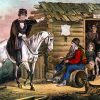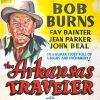calsfoundation@cals.org
The Gospel of Eureka
The independent documentary The Gospel of Eureka (2018), directed by Michael Palmieri and Donal Mosher, attracted acclaim for its mix of natural beauty and genial small-town tolerance. The portrait of Eureka Springs (Carroll County) focuses on the Great Passion Play, the Eureka Live Underground gay bar, and the relaxed attitudes of the organizers and patrons of both those local attractions.
The filmmakers cleverly cut back and forth between two groups of enthusiastic local amateur performers: those working on the Passion Play and those appearing in the drag queen extravaganzas at the bar. Bar owners Lee Keating and Walter Burrell (a couple for thirty-one years, until Keating’s death in 2017) and Kent Butler, marketing director and star of the Passion Play (playing Jesus), are all friendly and tolerant of the others’ rights. Most of the drag queens consider themselves devout Christians, and most of the Evangelical Christians who speak in the film do not reject gays. Keating proudly called his bar “a hillbilly Studio 54,” referencing a famous Manhattan counter-culture nightclub.
Mosher and Palmieri briefly note the darker history of Eureka Springs, spending a few minutes on Gerald L. K. Smith, the anti-Semitic founder of the Passion Play and maker of the Christ of the Ozarks statue (which is shown many times in the documentary, including in extreme close-up), and on Anita Bryant, an anti-gay crusader who attempted to put on her own religious show in Eureka Springs. Smith’s bigotry has been cut out of the play, and Bryant filed for bankruptcy in Arkansas after the failure of her show.
The documentary concludes by covering the 2015 referendum in which Eureka Springs voters approved a local ordinance banning discrimination against gays, by a vote of 579 to 231. It does not mention that the Arkansas General Assembly quickly overruled this local vote with the 2015 Intrastate Commerce Improvement Act, which forbade local protection for classes of people not protected by state law.
Variety (online March 13, 2018) called the “joyful” documentary a “cheerful small town portrait” and “an idealistic crowd-pleaser” with “a sharp eye for details.” New York Magazine (February 11, 2019) noted that “the easygoing tone of The Gospel of Eureka…distinguishes it from many other documentaries about timely social issues.” On the other hand, the New York Times (February 7, 2019) complained that the movie “refuses to grapple with its glaring contradictions” and accused the filmmakers of “favoring the superficial over the substantive.”
In a booklet issued with the Kino Lorber DVD, Caden Mark Gardner sums up the community’s contradictions as portrayed in the film: “The community joins in [gay] pride parades, they perform the Passion Play, go dancing to old gospel music alongside a shimmying drag queen, and still manage to go to church on Sundays.” The Gospel of Eureka was shown on POV, a PBS program, on June 24, 2019.
For additional information:
Gardner, Caden Mark. “The Gospel of Eureka.” Booklet issued with DVD. New York: Kino Lorber, 2019.
The Gospel of Eureka. https://www.thegospelofeureka.com/ (accessed December 9, 2019).
“The Gospel of Eureka.” Internet Movie Database. https://www.imdb.com/title/tt7977310/?ref_=nv_sr_1?ref_=nv_sr_1 (accessed December 9, 2019).
Michael Klossner
Little Rock, Arkansas








Comments
No comments on this entry yet.